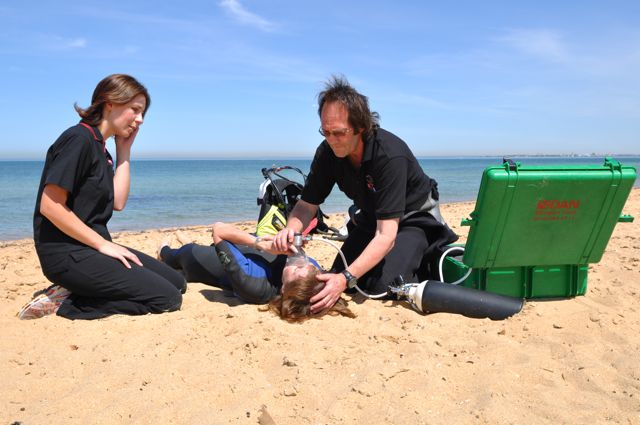
DAN Answers Your Questions About Dive Medicine
This site is designed to provide the answers to many common, as well as some less common, questions relating to diving medical issues.
An Introduction
As scuba diving's appeal broadens to all ages,
more individuals with some type of health concern are
asking about fitness requirements for scuba diving. Many years ago, when physicians
trained in diving medicine began discussing recreational scuba fitness requirements,
a "model diver" was created.
This model diver was the accumulation of medical expertise, diving physiology
and known disease processes. Restrictions to scuba diving include medical
conditions and illnesses that might impair or limit a diver's ability to perform underwater.
Unfortunately, very little research data existed to support many of
these theoretical restrictions to scuba diving. Now, as it was then,
it would be unethical to place individuals at risk of injury just to
prove actual risk is less than what we might expect.
Some restrictions have changed over the years, however. For example,
10 years ago, the fear of hypoglycaemia kept any person taking medication
for diabetes out of scuba diving. Today, individuals who control their diabetes
with oral medication may dive; and perhaps, once DAN's research on diving with
diabetes is completed, the scuba training agencies may accept a select group of
insulin-requiring persons with diabetes.
There are still prospective and current divers who are going to be advised against
diving because of a medical condition, not just because they have a medical problem
but because of the severity of their symptoms. In general, any condition that may impair
mental or physical performance, induce pain or loss of consciousness, or cause
nausea or vomiting must be evaluated before diving. Additionally, there are some
medical conditions that may be affected by diving physiology, such as some blood
disorders which are sensitive to changes in blood volume.
This site presents some questions that concern chronic and long term illness, as well
as short term illness and injury. DAN physicians and others have put together some
answers to help explain these medical concerns to divers and their physicians so
that, together, they can make an informed decision about scuba diving.
This is one way that we at DAN strive to increase general medical knowledge in
the scuba diving community and prevent injuries and deaths related
to these medical conditons.
Director DAN America Medical Services
Disclaimer & Important Notice
All divers, diving instructors, diving physicians and
those interested in diving first aid should carefully read the following notice.
The information and advice available on this site has been carefully
researched by its authors, and is believed to represent the state of learning
as at the time of writing. However, knowledge, opinions and practise
can vary from time to time, and from place to place. Differing views
exist within the diving medical profession about the medical management,
understanding and importance of various medical conditions, and on the implications
of diving for particular individuals and in particular circumstances.
Any individual who is taking or has taken medication or who may have, or
has or has had any particular medical condition should consult a diving physician.
Individual susceptibilities and differences are infinitely variable, and
the following information and advice is of a general nature.
It does not replace the need for a person to consult with and seek
advice from his or her own physician.

